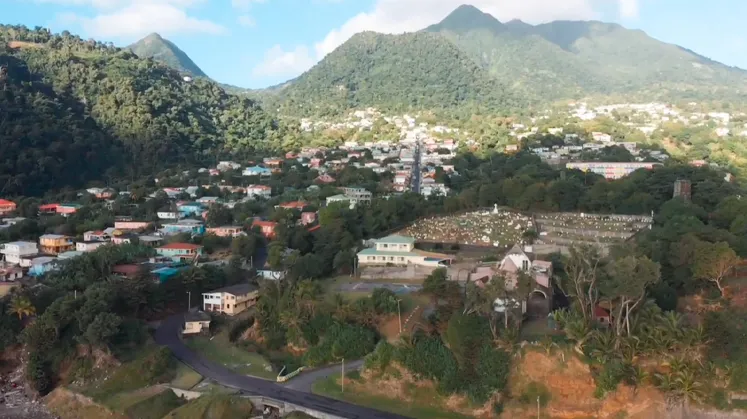Berekua

Berekua, also known as Grand Bay, is the principal community in Saint Patrick Parish and one of Dominica’s most vibrant cultural centres. Situated on the island’s southern coast, Berekua overlooks the Caribbean Sea and serves as a regional hub for commerce, heritage, and community life. Its mountainous backdrop and coastal proximity make it a geographically strategic and culturally rich settlement.
Historical Origins and Colonial Influence
The Berekua area was initially settled by Indigenous Amerindians over two thousand years ago. The site of the first settlement, an area called “Spring,” was valued for its reliable freshwater. The name “Bericoua” or “Berekua” stems from a Kalinago word meaning “place of large crabs,” named for the abundance of land crabs that once populated the coast.
During the French colonial period (1747–1763), the Jesuits established plantations and built the first Catholic church using enslaved African labor. This early European presence deeply influenced the community’s spiritual, architectural, and agricultural roots—elements still visible today.
Infrastructure and Road Connectivity
Berekua is accessible via the southern network of roads linking it to Roseau, Loubiere, and other southern villages. Major infrastructure improvements—such as the Loubiere to Bagatelle Road Rehabilitation Project—are reshaping connectivity in the area. This 11-kilometer upgrade aims to enhance climate resilience, improve social service access, and stimulate economic growth throughout the southern corridor.
Within the village, roads like Geneva, Tete Morne Road, and Bense Trail lead to housing developments, schools, and farms, with intermittent bus services connecting residents to the capital and regional markets.
Economy and Local Enterprise
The economy of Berekua is rooted in agriculture, with fertile valleys supporting crops such as root vegetables, plantains, citrus fruits, and bananas. Farmers contribute to local and national food security, with some produce exported through the Roseau Market and Portsmouth Market.
Small-scale manufacturing and retail businesses also contribute to economic activity. These include woodworking, furniture production, clothing retail, and a soap-making operation in the Geneva area. Informal street vending is a common form of trade, particularly during cultural festivals and market days.
Culture, Arts, and Community Expression
Often referred to as Dominica’s cultural capital, Berekua is known for its vibrant artistic traditions. Cadence music, Creole storytelling, dance, and craft are deeply embedded in community life. The village celebrates annual Creole Day festivities with parades, traditional dress, music, and local cuisine.
Notably, Berekua was home to RADIO En Ba Mango, Dominica’s first community-run radio station, founded by Urban “Man’I” Dangleben in the mid-1980s. The station symbolized the village’s pioneering role in media and cultural self-expression.
Notable Personalities and Contributions
Berekua has produced several prominent national figures, most notably Pierre Charles, who served as Prime Minister of Dominica from 2000 to 2004. Before ascending to national leadership, Charles was deeply involved in grassroots governance through the Grand Bay Village Council and championed rural development, education, and trade infrastructure.
The village continues to be a fertile ground for public servants, educators, artists, and athletes, many of whom contribute to Dominica’s national development.
Religion, Education, and Public Services
Berekua houses key institutions such as the Grand Bay Roman Catholic Church, a historical building that serves as a center of spiritual life. Schools include the Grand Bay Primary School and Pierre Charles Secondary School, offering education from early childhood through adolescence.
Community services include a police station, health clinic, village council office, and sports facilities such as the Grand Bay playing field and basketball court. A growing youth population benefits from cultural and sports programming supported by local NGOs and the Ministry of Culture, Youth and Sports.
Moving Forward: Development and Identity
Today, Berekua continues to balance tradition with progress. Its ongoing road improvements, community empowerment programs, and educational initiatives are aligned with Dominica’s broader goals for sustainable rural development.
Still, the heart of Berekua lies in its people—their music, craftsmanship, activism, and everyday resilience. It remains one of the few communities where cultural heritage is not just preserved but lived daily, making it a cornerstone in the identity of the Nature Isle.




